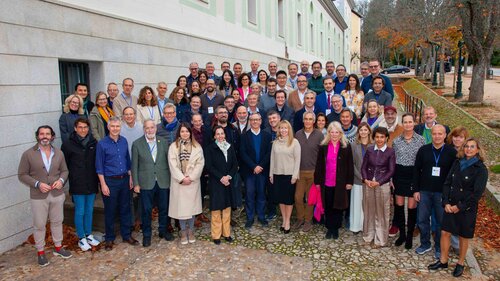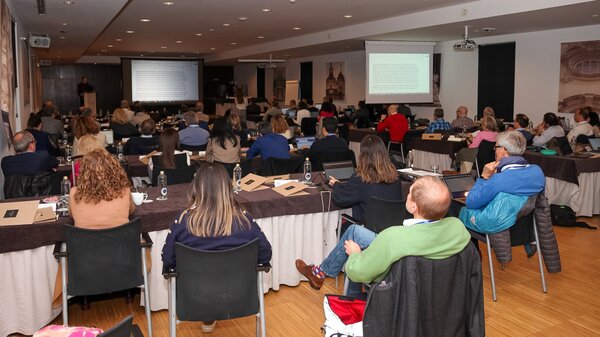![]()
19 November 2024
Advancing periodontal diagnosis: The 20th European Workshop on Periodontology explores cutting-edge innovations
Categories:Clinical Practice, Institutional

The 20th European Workshop on Periodontology titled "Periodontal diagnosis: contemporary and emerging technologies," took place from 10 to 13 November 2024, in La Granja de San Ildefonso, Spain. The in-person workshop, organised by the EFP Workshop Committee and supported by the EFP with Kenvue sponsorship, gathered more than 70 participants from 21 countries across Europe, Asia, North America, and South America, of which one-third were women. The international gathering, explored the latest in periodontal diagnosis under the guidance of workshop chair Professor David Herrera.
This year’s focus on periodontal diagnosis responds to the rapid evolution of diagnostic technologies and the implementation of the 2018 classification of periodontal diseases, which has established clearer case definitions, aiming to provide foundations for improved diagnosis. Prof. Herrera explains the workshop’s objectives: “We are witnessing a transformative period in periodontal diagnostics, with innovative technologies reshaping our approaches. Our goal is to evaluate the efficacy of these tools and consider how they may enhance accuracy and lead to better patient outcomes.”
The workshop was organised into three working groups (WGs), each tackling distinct aspects of periodontal diagnosis. Working group 1 examined traditional diagnostic methodologies, focusing on clinical assessment methods and the use of ionizing and non-ionizing imaging techniques to refine diagnostic precision. In addition, the performance of the 2018 classification was assessed.
Working group 2 explored biomarkers for diagnosis and risk assessment, evaluating microbial, host, and genetic markers. The findings from WG2 could be significant for tailoring diagnosis and understanding individual risk profiles in periodontal health and disease, and could also have a significant impact when designing treatment plans
Working group 3 studied emerging technologies, including artificial intelligence, predictive algorithms, and digital tools applicable in both dental and non-dental settings. These technologies promise to improve predictive capacities and facilitate more proactive approaches to periodontal care.

EFP president Moritz Kebschull underscored the importance of this forward-looking approach: “As we navigate through evolving diagnostic possibilities, our aim is to equip dental professionals with the tools to provide faster, more accurate diagnoses. This workshop represents the EFP’s commitment to foreseeing and integrating innovation that benefits practitioners and, most importantly, patients.”
The workshop’s outcomes include an assessment of the 2018 classification's performance, evaluation of traditional and biomarker-based diagnostic methods, and a mapping of emerging technologies. Additionally, the workshop aimed to enhance the quality of research in periodontal diagnostics, promoting established guidelines for diagnostic studies (STARD, QUADAS, PRISMA-DTA, TRIPOD, etc.).
Speaking at the event, Soha Dattani, Scientific Engagement Lead, Kenvue, said: “We follow a care-forward approach and are strongly committed to oral health and evidence-based at home prevention. We are thrilled to be the sole sponsor of this workshop and to contribute to the ongoing dialogue and advancements in periodontal diagnosis.”
The workshop's findings will be disseminated in a special issue of the Journal of Clinical Periodontology in mid 2025, with an accompanying communication campaign to highlight the importance of periodontal diagnosis within the World Health Organization’s (WHO) 2030 agenda.
“The workshop not only celebrated twenty editions of EFP European Workshops, but also laid the foundation for the future of periodontal care,” concluded Herrera.




